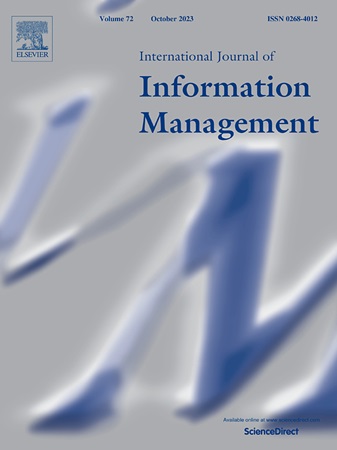跨创造阶段的人类-基因合作:形成新颖性和有用性的认知机制
IF 27
1区 管理学
Q1 INFORMATION SCIENCE & LIBRARY SCIENCE
International Journal of Information Management
Pub Date : 2025-10-03
DOI:10.1016/j.ijinfomgt.2025.102986
引用次数: 0
摘要
生成式人工智能(GenAI)在创造性领域显示出显著的潜力;然而,现有的研究尚未充分探索如何优化人类-基因协同作用或揭示其对创造力影响的潜在机制。这项研究超越了创造力作为一个单一过程或整体结果的观点,并研究了人类-基因合作如何不同地影响想法产生和想法阐述的不同创意阶段。根据创造过程理论和目标取向理论,我们提出人类-基因协作激活了特定阶段的心理机制,以追求不同的创造目标。采用多方法方法,包括定性研究(N = 20)、两个实验室实验(N1 = 42; N2 = 44)和一个在线行为实验(N = 198),我们发现,在想法产生阶段(与细化阶段相比),人类与genai的协作通过增加认知灵活性来提高创意的新颖性,而在想法细化阶段(与生成阶段相比),人类与genai的协作通过减少认知过载来提高创意的有用性。此外,感知的GenAI智能通过认知超载调节协作阶段和有用性之间的间接关系。通过解构创造过程,本研究提供了对人类- GenAI协作机制和边界条件的细致理解,推进了人工智能辅助创造力的理论对话,并为将GenAI整合到创造性和组织工作流程中提供了可操作的指导。本文章由计算机程序翻译,如有差异,请以英文原文为准。
Human–GenAI collaboration across creative phases: Cognitive mechanisms shaping novelty and usefulness
Generative artificial intelligence (GenAI) has demonstrated remarkable potential in creative domains; however, existing research has yet to fully explore how to optimize human–GenAI synergy or uncover the mechanisms underlying its impact on creativity. This study transcends the view of creativity as a singular process or monolithic outcome and examines how human–GenAI collaboration differentially influences the distinct creative phases of idea generation and idea elaboration. Drawing on creative process theory and goal orientation theory, we propose that human–GenAI collaboration activates phase-specific psychological mechanisms in pursuit of divergent creative goals. Using a multimethod approach, including a qualitative study (N = 20), two lab experiments (N1 = 42; N2 = 44), and an online behavioral experiment (N = 198), we find that human–GenAI collaboration in the idea generation phase (compared with the elaboration phase) enhances creative novelty by increasing cognitive flexibility, whereas human–GenAI collaboration in the idea elaboration phase (compared with the generation phase) improves creative usefulness by reducing cognitive overload. Furthermore, perceived GenAI intelligence moderates the indirect relationship between collaboration phases and usefulness through cognitive overload. By deconstructing the creative process, this research offers a nuanced understanding of the mechanisms and boundary conditions of human–GenAI collaboration, advancing theoretical conversations on AI-assisted creativity and providing actionable guidance for integrating GenAI into creative and organizational workflows.
求助全文
通过发布文献求助,成功后即可免费获取论文全文。
去求助
来源期刊

International Journal of Information Management
INFORMATION SCIENCE & LIBRARY SCIENCE-
CiteScore
53.10
自引率
6.20%
发文量
111
审稿时长
24 days
期刊介绍:
The International Journal of Information Management (IJIM) is a distinguished, international, and peer-reviewed journal dedicated to providing its readers with top-notch analysis and discussions within the evolving field of information management. Key features of the journal include:
Comprehensive Coverage:
IJIM keeps readers informed with major papers, reports, and reviews.
Topical Relevance:
The journal remains current and relevant through Viewpoint articles and regular features like Research Notes, Case Studies, and a Reviews section, ensuring readers are updated on contemporary issues.
Focus on Quality:
IJIM prioritizes high-quality papers that address contemporary issues in information management.
 求助内容:
求助内容: 应助结果提醒方式:
应助结果提醒方式:


